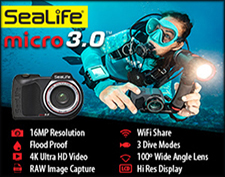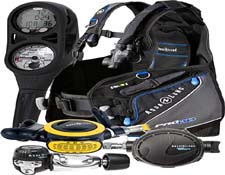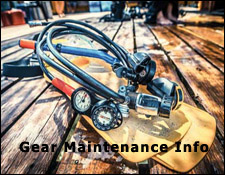

|


|
 |
 |
 |
 |
 |
 |
 |
 |
Gear Maintenance: Protect Your Investment and Prevent Dive Accidents The adage “an ounce of prevention is worth a pound of cure” dates back to the 18th century but still rings true today. Proactive measures such as dental checkups, travel immunizations and oil changes can prevent catastrophic problems.
Most divers understand the value of preventative maintenance, yet many fail to have their dive gear serviced each year. Scuba gear is life-support equipment and is just as important to maintain as one’s physical health or personal vehicle.
Every year Divers Alert Network (DAN) receives multiple reports of preventable accidents caused by improperly maintained gear. According to DAN’s most recent Annual Diving Report, 11 percent of dive accidents are caused by equipment mishap. Read on to learn about dive gear maintenance, how often to have your scuba gear serviced and which piece of equipment divers neglect the most.
The adage “an ounce of prevention is worth a pound of cure” dates back to the 18th century but still rings true today. Proactive measures such as dental checkups, travel immunizations and oil changes can prevent catastrophic problems.
Most divers understand the value of preventative maintenance, yet many fail to have their dive gear serviced each year. Scuba gear is life-support equipment and is just as important to maintain as one’s physical health or personal vehicle.
Every year Divers Alert Network (DAN) receives multiple reports of preventable accidents caused by improperly maintained gear. According to DAN’s most recent Annual Diving Report, 11 percent of dive accidents are caused by equipment mishap. Read on to learn about dive gear maintenance, how often to have your scuba gear serviced and which piece of equipment divers neglect the most.
Regulators Scuba regulators should be overhauled annually, or as required by manufacturer recommendations. Active divers may need their regulators serviced more frequently (always follow the manufacturer’s recommendations for specific applications or heavy-use situations). The submersible pressure gauge (SPG) should also be inspected annually. Post-dive care is critical for maintaining the function of a regulator assembly between service intervals. Always use the dust cap, and soak both the first and second stages in clean water after diving. Most divers understand the value of preventative maintenance, yet many fail to have their dive gear serviced each year. Dive Computer Many divers use the low battery warning as an indicator their computer needs service, but this is a mistake. Most dive computers require annual or biannual service (refer to the manufacturer’s guidelines). In addition to replacing the dive computer battery (and transponder battery, if applicable) the O-rings must be checked, and the unit should be inspected for signs of salt buildup. Buoyancy Compensation Device (BCD) Some BCDs have a second-stage regulator attached to the low-pressure inflator, yet divers commonly neglect to have their BCD serviced at the same time as their regulator assembly. A BCD should be serviced annually, or as often as the manufacturer recommends. The low-pressure inflator and bladder can deteriorate and, should either one fail during a dive, a serious diving accident may occur. Drysuit Drysuit owners should have their suits inspected each year. Inspection and pressure testing can find pinhole leaks before they become dive-ruining floods. Tank A scuba cylinder should be visually inspected every year for corrosion, dents, pitting and damage to the valve. Hydrostatic testing should be performed every five years or as determined by cylinder type and local regulations. Accessories Ancillary gear such as dive lights, strobes, surface marker buoys (SMBs), dive watches, etc. should also be inspected regularly. Check O-rings, replace batteries and periodically inflate the SMB to ensure your scuba accessories function properly when needed. Mask, Snorkel, Fins Snorkeling gear does not require regular service, but it should be rinsed after every dive and properly stored. Put the mask back in its original box to protect it from being crushed or deformed by heavier items. Check fin straps, the mask strap and the snorkel keeper periodically for signs of wear. Protect Your Scuba Gear from Ultraviolet (UV) Rays Scuba divers may love the sun, but scuba gear does not. Ultraviolet (UV) radiation can damage dive equipment, especially items made of neoprene. Stow gear under a bench, in the shade or under a towel if necessary. Whether you dive every weekend or only on holiday, your scuba gear requires regular service. In addition to prolonging the life of the equipment, properly maintained gear is less likely to cause a dive accident. By: DAN - Divers Alert Network More Scuba Gear Info -> |
| DiveGuide.com Scuba Diving Vacations & Dive Holidays - Book direct dive travel with scuba diving operators, resorts, dive liveaboard yachts and dive travel representatives worldwide. We provide free scuba diving information for the traveling diver on vacation and holiday in and to scuba diver destinations around the world. |












|